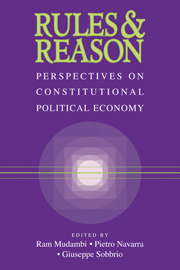Book contents
- Frontmatter
- Contents
- Foreword
- Preface and Acknowledgments
- List of Contributors
- 1 Constitutional Issues in Modern Democracies
- PART I CONSTITUTIONAL THEORY
- 2 On Writing a Constitution
- 3 Constitutional Order and Economic Evolution: Competitive and Protectionist Interests in Democratic Society
- 4 The Efficacy of Arbitrary Rules
- 5 Constitutional Political Economy and Civil Society
- 6 The Constitutional Conflict between Protecting Expectations and Moral Evolution
- 7 Ideological Competition and Institutions: Why “Cultural” Explanations of Development Patterns Are Not Nonsense
- PART II ELECTORAL SYSTEMS AND INSTITUTIONS
- PART III CONSTITUTIONAL ISSUES FOR A FEDERAL STATE
- Index
2 - On Writing a Constitution
Published online by Cambridge University Press: 05 June 2012
- Frontmatter
- Contents
- Foreword
- Preface and Acknowledgments
- List of Contributors
- 1 Constitutional Issues in Modern Democracies
- PART I CONSTITUTIONAL THEORY
- 2 On Writing a Constitution
- 3 Constitutional Order and Economic Evolution: Competitive and Protectionist Interests in Democratic Society
- 4 The Efficacy of Arbitrary Rules
- 5 Constitutional Political Economy and Civil Society
- 6 The Constitutional Conflict between Protecting Expectations and Moral Evolution
- 7 Ideological Competition and Institutions: Why “Cultural” Explanations of Development Patterns Are Not Nonsense
- PART II ELECTORAL SYSTEMS AND INSTITUTIONS
- PART III CONSTITUTIONAL ISSUES FOR A FEDERAL STATE
- Index
Summary
Someone once said that there are two sorts of people: Those who view the world as consisting of two sorts of people, and those who do not.
Edmund S. PhelpsThere are two sorts of students of politics: those who believe that constitutions have important consequences for a country's political history, and those who think they do not. I am one of those who believe that constitutions can matter, although they do not necessarily do so. After convincing you of this, I shall draw out some of the implications for constitutional design, and for the design of the process by which the constitution gets written.
It is uncontroversial that constitutions need not matter. Brazil has had more than eighty constitutions and most Brazilians probably would not be able to identify any one of them that had a significant effect on the country. The constitution of the former USSR had some admirable sounding sections but did not produce an admirable political system. If a constitution is ignored, it cannot have an impact.
But not all constitutions have been ignored. I begin by describing three cases where constitutions did matter. Two had good consequences, one not so good.
Three Cases Where Constitutions Mattered
A Ancient Athens
Democracy was invented during the sixth century B.C. in Attica through a series of reforms begun by Solon and largely completed by Cleisthenes. Prior to and during much of this century Attica was ruled by individuals (tyrants) and groups (oligarchies) drawn from the aristocracy.
- Type
- Chapter
- Information
- Rules and ReasonPerspectives on Constitutional Political Economy, pp. 9 - 32Publisher: Cambridge University PressPrint publication year: 2001
- 2
- Cited by

